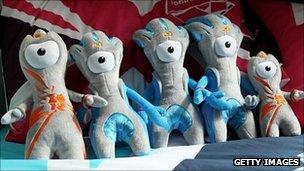London 2012: 'Exploitation' of factory workers prompts action
- Published

Soft toys are being made at factories in China on behalf of UK-based firms
Tougher measures are being brought in to protect workers at factories producing Olympic merchandise after a report cited evidence of exploitation.
The Playfair study said child labour and dangerous working practices were uncovered at two factories in China.
Games organisers Locog said they had taken action in light of the claims.
The Trades Union Congress (TUC) said Locog's ethical code had not been enough to prevent the abuses but hoped future Games would now benefit.
Researchers, working on behalf of the TUC and campaign group Labour behind the Label, went undercover at the factories for two months last year.
At one site workers were making London 2012 pin badges for Hanov UK, based in London, and at the other Games' mascots Wenlock and Mandeville were being produced for Telford-based Golden Bear.
The report, Toying with Workers' Rights, claims workers were forced to work excessive overtime, for little pay, in often dangerous and exhausting working environments.
Action plan
It found breaches of every one of the nine standards Locog had committed to implementing in its supply chain.
In response to the report's publication on Thursday Locog brought in new measures to give workers greater protection.
These include making information available about employment rights, providing training and publishing names and locations of factories in the supply chain.
Locog chairman Seb Coe said: "As soon as we were made aware of the Playfair 2012 report we instructed our independent monitor to carry out a comprehensive investigation and review. The outcome of this will be made public as soon as it is concluded.
"We have taken a lead in ethical sourcing and supply chain management but there is always more to do and we are committed to making a real difference to workers' lives and creating a valuable legacy that we can share."
Locog, which placed a high priority on ethical issues when it secured the bid for the Games, has also pledged to pass on the lessons learned to the International Olympic Committee (IOC) and future Games organisers.
TUC General Secretary Brendan Barber said: "We welcome Locog's acknowledgement that further action is necessary and its commitment to act immediately to ensure that factory owners can no longer exploit workers in the name of the Olympics.
"We're hopeful that a marker has now been set for all future Games and that the IOC will play a leading role in taking this work forward so that the exploitation of workers in Olympic supply chains can become a thing of the past."
Labour Behind the Label's Sam Maher said: "It's very frustrating because while it's a positive step it's what we have been asking for since they got the Games.
"It's to late to make a difference to workers on the ground for the London Olympics but Locog's actions make it difficult for the next organising committee to ignore it."
A statement from Golden Bear said it was co-operating fully with Locog and has been working closely with the TUC to develop a series of agreed corrective action plans for the factory.
Hanov UK said it stopped working with the factory in question in August 2011 and has co-operated fully with Locog over the matter.
The Playfair campaign calls on those who organise and profit from sports events to take specific steps to ensure workers making sporting goods and building venues are not exploited.
- Published21 January 2012
- Published17 August 2010